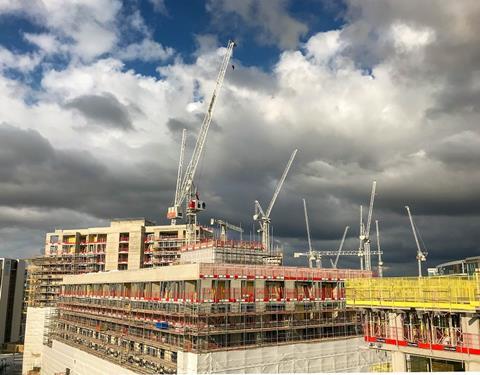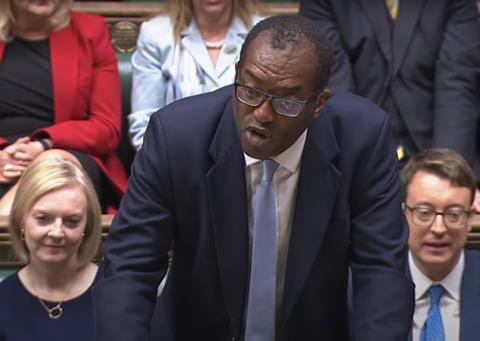Kwasi KwartengŌĆÖs growth plan announcements were met with financial turmoil on the markets and dire predictions for housing. But what are housebuilders finding on the ground and how badly is development likely to be affected? Joey Gardiner finds out
Ever since Kwasi KwartengŌĆÖs ill-omened ŌĆ£fiscal eventŌĆØ just over two weeks ago, the airwaves have been filled with doom and gloom about the housing market. Given that the chancellor included a ┬Ż1.6bn per annum stamp duty giveaway among his growth plan measures, itŌĆÖs probably pretty safe to say that a collapse in housebuilder share prices ŌĆō now down anything between 7% and 18% since his announcement ŌĆō plus predictions of falls of 10%-15% in house prices and a steep drop in transactions, were not what he had hoped for.

KwartengŌĆÖs announcement, of course, came amid a period of already weakening sentiment in the housing market, with housebuilders having reported falling reservation rates over the summer, and the HalifaxŌĆÖs latest numbers, published on Friday, showing prices have essentially stayed flat since June. Neal Hudson, MD of market analyst Resi Analsyst, told Ą■│▄Š▒▒¶╗ÕŠ▒▓į▓ĄŌĆÖs sister title Housing Today shortly after the mini budget the market now looks to be heading for the ŌĆ£worst case scenarioŌĆØ.
So far, however, despite widespread speculation about what might happen, there has been precious little evidence published of how buyers and developers of new homes are actually reacting to KwartengŌĆÖs statement. So, two weeks on from his tectonic announcement, what are developers and others experiencing on the ground, and what are the expectations of what this all could practically mean for the organisations out there building new homes?
Drastic
The negative market reaction to KwartengŌĆÖs statement was ŌĆō as the world knows ŌĆō not based on its assessment of the impact of individual ŌĆ£housingŌĆØ measures such a stamp duty, investment zones and planning reforms, but on fears over what his unfunded and inflationary package of tax cuts for the wealthy would mean for financial stability in the UK. While the run on the pound caught the headlines, much more significant for the residential sector was the impact on lending rates, with financial markets increasing their expectations for interest rates next year from 4% to between 5% and 6%.
As panic caught hold in the days after, mortgage lenders initially withdrew more than 40% of mortgages. While some have now started coming back on to the market ŌĆō the number of products had by Friday risen back to 2,533 from a low of 2,258, (still well below the 3,961 available prior to 23 September) ŌĆō the average rate has soared by between 1% and 2%. It is now 6.16% for a two-year fixed rate mortgage, and 6.07% for a five-year fix ŌĆō both more than decade highs.
The problem for homebuyers, homeowners and residential developers, is that with house prices as they are, every analysis suggests that interest rates at the current level make housing simply unaffordable by historical measures. Analyst firm Capital Economics, which joins investment bank Credit Suisse in predicting house price falls of 10%-15% in the UK next year, says interest rates at this level make household affordability ŌĆō in terms of the price of a home compared with a familyŌĆÖs income ŌĆō comparable to levels seen prior to crashes in the late 1980s and 2008.
Of course not everyone thinks drops of this magnitude are a dead cert. Lucian Cook, head of residential research, Savills, says the key factor determining exactly how significant any falls in prices will be is ŌĆ£how long interest rates are kept highŌĆØ ŌĆō which is as yet unknown.
But Capital EconomicsŌĆÖ senior economist Andrew Wishart nevertheless says the existing interest rate movements mean repayments on an average priced home under a 75% loan-to-valuye mortgage could go up from ┬Ż620 per month, for someone that took out a mortgage last year, to ┬Ż1,120, causing such a reduction in buying power that it ŌĆ£makes a significant drop in house prices inevitableŌĆØ.
The stock market is making some pretty drastic assumptions. [ŌĆ”] ThereŌĆÖs more pain to come.ŌĆØ
Shane Carberry, analyst, Goodbody
It is these expectations that have weighed so heavily on housebuildersŌĆÖ valuations since the announcement. Shane Carberry, analyst at Irish investment bank Goodbody, says investor sentiment for UK housebuilders is ŌĆ£pretty bleakŌĆØ, with housebuilders such as such as Barratt Developments, Bellway, Redrow, Taylor Wimpey and Vistry Group all trading significantly below the value of the assets on their books. He says: ŌĆ£This means the stock market is making some pretty drastic assumptions ŌĆō and is implying that house prices will decline sufficiently for housebuilders to have to take a significant impairment to assets, which we see as unlikely.ŌĆØ

Carberry is optimistic for the sector in the longer term, and says valuations look cheap given the potential. But even he concedes there will be ŌĆ£more pain to comeŌĆØ before things start to get better, and that the expectations from most builders prior to the mini budget, of modest volume and profit growth next year, look ŌĆ£more and more difficult to achieveŌĆØ.
Likewise, Charlie Campbell, investment analyst at Liberum Capital, says investors are pricing in a 15% drop in volume from housebuilders and a big drop in house prices. ŌĆ£The share price suggests theyŌĆÖre looking at a plausible worst case scenario, then taking off a bit more for luck,ŌĆØ he adds.
Armageddon?
So much for the view from the top. Murray Smith, managing director of new build home sales and marketing specialist SiteSales, looks at things from the coal face. His business, which manages the selling of homes across greater London and parts of the South-east principally for housing associations and local authorities, saw a near 20% drop in enquiries on its sites in the week following the mini budget, as fears over a house price crash dominated headlines: where he would normally expect 1,200 enquiries, he received around 1,000. And that week, where he would normally sell 20-25 homes, he only sold 15 ŌĆō so sales were hit too, by at least 25%.
However, he says that since that first week, traffic has started to pick back up, and that while there was a clear impact from the fiscal event ŌĆō it fell short of the ŌĆ£ArmageddonŌĆØ he was expecting. ŌĆ£Given the headlines weŌĆÖd had for a whole week since the mini-budget I was actually pleasantly surprised with the numbers we did get on site,ŌĆØ he says. ŌĆ£This week so far, the numbers arenŌĆÖt bad. It just shows that over-riding everything is just huge demand for housing.ŌĆØ
Likewise, Richard Donnell, research director at online estate agent Zoopla, said the service saw a drop in traffic of around 10% in the week following the mini budget ŌĆō indicating an impact from the statement, but nothing particularly out of the ordinary. ŌĆ£So far itŌĆÖs a blip really ŌĆō what weŌĆÖre seeing is nothing like the broader consumer confidence charts, for example, which have fallen like a stone.ŌĆØ
Part of this, Donnell says, is that homebuyers with mortgage offers made prior to the mini-budget are keen to tie down sales in order that they donŌĆÖt miss their chance to get low rates. Some estate agents, he says, have even anecdotally reported to him a ŌĆ£mini-rushŌĆØ of buyers looking to secure purchases.
The clear expectation, however, is that new buyers who would otherwise have come into the market, will now not do so given what has happened to rates ŌĆō but the impact of this effect will take longer to discern. ŌĆ£People arenŌĆÖt going to walk away from a cheap deal now if they have one. But there arenŌĆÖt going to be new buyers coming into the market,ŌĆØ says Donnell. ŌĆ£ItŌĆÖll be a much lower number of buyers from now until Christmas. WhatŌĆÖs important is where we are in January in terms of interest rates when the market would be re-starting.ŌĆØ
No rush
While it may not be Armageddon in the current market, it seems hard to imagine that the number of sales in the housing market will not decline overall next year. As one insider at a listed housebuilder says: ŌĆ£Buyers were already feeling uncertain and there was a sense of putting off making a big purchasing decision. Now these big movements in interest rates to potentially more extreme levels are not helping, and definitely having an effect on consumers and the market.ŌĆØ
The situation will be exacerbated for housebuilders, coming as it does at the same time as the pre-planned withdrawal of the Help to Buy Equity Loan product at the end of this month, which was originally introduced specifically to help buyers struggling to access mortgages.
SavillsŌĆÖ Cook says he would expect sales volumes at housebuilders to fall in line with the wider market, given the withdrawal of Help to Buy ŌĆō unless the build to rent sector rides to the rescue. ŌĆ£WeŌĆÖre going to see lower transactions and price pressure on the market ŌĆō much less favourable market conditions for housebuilders,ŌĆØ he says. ŌĆ£Pre-Help to Buy there was an incredibly strong correlation between overall transaction volumes in the residential market and development delivery, which was dislocated by Help to Buy, but now thatŌĆÖs gone IŌĆÖd expect that historic relationship to return.ŌĆØ
If the market does cool significantly, the listed builder insider says housebuilders will first look at increasing the levels of incentives offered to buyers in order to sell homes, then look to reduce prices if they still cannot attract buyers, and only then look to slow or stop building homes if buyers cannot be found.
However, the financial position of the UKŌĆÖs listed housebuilders gives them options to ride out any storm that they did not have in 2007/8, when many had significant levels of debt on the balance sheet. Now most have cash in the bank, plus bulging forward order books, meaning they do not have to rush to sell homes to pay down debt. LiberumŌĆÖs Campbell, who believes talk of a price crash is overblown, says: ŌĆ£They can tweak incentives and see where they get to, and if demand is still low in a couple of months they can tweak prices. But thereŌĆÖs no rush.ŌĆØ
>> See also: HousebuildersŌĆÖ shares slump for second successive day after mini-budget alarm
>> See also: Meet the shadow cabinet: who are they and what would they do for construction?
>> See also: A non-Budget that was more fantasy economics than fiscal reality
GoodbodyŌĆÖs Carberry thinks some could choose to preserve margin rather than volume, but that the share prices donŌĆÖt reflect this strong financial position. ŌĆ£The interesting question will be whether they react by pushing volume or whether they taper volume and keep their margins intact,ŌĆØ he says. ŌĆ£Unlike in the global financial crisis, balance sheets are sufficiently strong enough so that this time there is less pressure to prioritise volume over margin.ŌĆØ
However, if it looks likely to take time for the impact of the mini-budget to filter through to housebuilders with big forward order books, the challenge posed by it to developing housing associations is more immediate. This is because the uncertainty in the financial markets over the governmentŌĆÖs strategy has increased the cost of borrowing generally ŌĆō not just for mortgages ŌĆō and housing associationsŌĆÖ development models rely on affordable borrowing to finance projects across lengthy time horizons.
Since KwartengŌĆÖs announcement, the cost of government borrowing, as measured by 10 year gilts ŌĆō against which housing association borrowing is pegged ŌĆō has risen by well over 1% ŌĆō which the boss of G15 association Optivo says is enough, allied with the uncertainty related to the proposed cap in housing association rents, to put the viability of all its developments in doubt. Paul Hackett, chief executive of Optivo, says his association has put all of the development schemes that are in its pipeline, but which do not have construction contracts signed, under review. This effectively puts six schemes of different sizes on pause.

He says: ŌĆ£The change [in borrowing rates] has really affected scheme viability. Now weŌĆÖve got to review all our schemes on a scheme by scheme basis to see what we can do, which involves going back to vendors to discuss the land price, re-planning schemes potentially, or the use of re-cycled grant.ŌĆØ
He says this issue was separate from the issue of demand in the private housing market, and that so far he has seen a strong desire from buyers with a mortgage offer to complete on shared ownership sales. ŌĆ£WeŌĆÖre proceeding with scheme on site and weŌĆÖve got lots of very keen purchasers,ŌĆØ he says.
Hackett is unlikely to be alone in this. SiteSalesŌĆÖ Murray Smith says he has had ŌĆ£calls from most of the G15 [leading London housing associations] since the mini-budget, scared stiff about what it meansŌĆØ.
Logic tells you things are going to get worse. But we thought that about covid. The question for me, is what kind of a price floor does this chronic shortage of housing in the UK provide the market?
Graham Cherry, co-owner Stonebond
ŌĆ£ThereŌĆÖs a sense of real caution about whether you press that button for going ahead with development or not,ŌĆØ Smith says. ŌĆ£My view is that many schemes are going to be put on hold until things are a bit clearer. Delivery is going to tumble.ŌĆØ
OptivoŌĆÖs Hackett agrees: ŌĆ£If other housing associations arenŌĆÖt having the same conversations as us now, then they will be very shortly. This is an issue affecting the whole sector. ThereŌĆÖll be a direct impact on housing starts ŌĆō even if itŌĆÖs only a temporary blip.ŌĆØ
All in all, the prospects for the residential sector appear at their bleakest since March 2020, when developers were forced to shut sites for six weeks as covid broke over the UK. If there is a silver lining to this situation it is that the residential market ŌĆō as it did during the covid crisis and after Brexit ŌĆō has constantly defied predictions of death and destruction over the last decade. As Graham Cherry, co-owner of Chelmsford-based partnerships housebuilder Stonebond says: ŌĆ£Logic tells you things are going to get worse. But we thought that about covid. The question for me, is what kind of a price floor does this chronic shortage of housing in the UK provide the market?ŌĆØ
Developers will be hoping the sector can prove the forecasters wrong once again.


























No comments yet